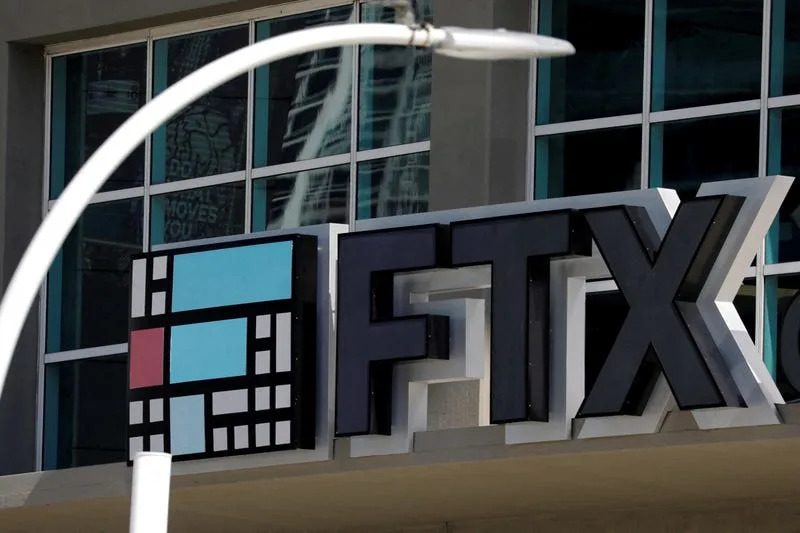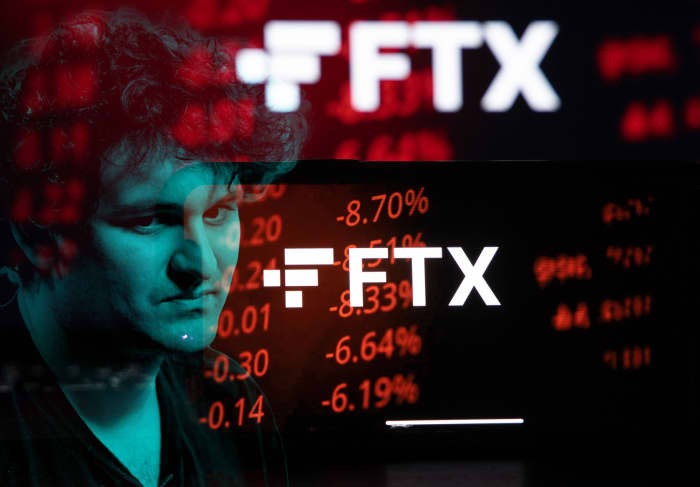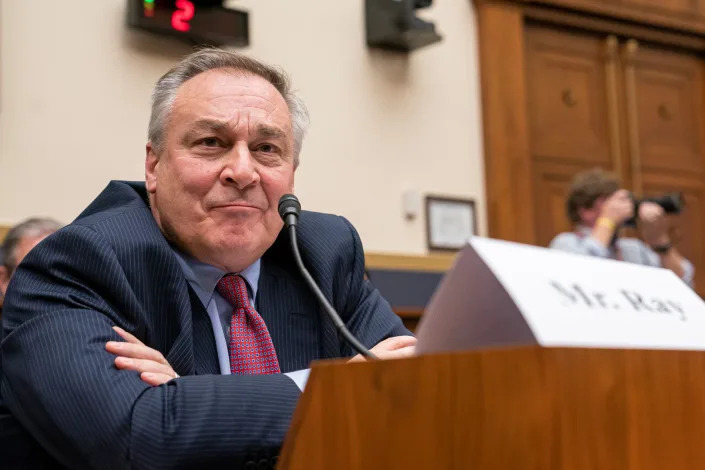CRIMINAL CRYPTO CAPITALI$M
U.S. Investigators Subpoena Hedge Funds in Binance Money-Laundering Probe: Report

Elizabeth Napolitano
Sat, January 7, 2023
Federal prosecutors are investigating the relationship between Binance and U.S.-based hedge funds as part of a broader investigation into the cryptocurrency exchange's possible skirting of money-laundering guardrails, according to a report by the Washington Post.
Heading the investigation is the U.S. Attorney's Office for the Western District of Washington in Seattle, which, in recent months, has sent subpoenas to firms requesting records of their dealings with Binance, the Post reported, citing two people who had reviewed one of the subpoenas.
The subpoenas come at a time when Binance, the world's largest crypto exchange by daily trading volume, faces intense media and regulatory scrutiny over its business practices and financials. That scrutiny boiled over late last year in the wake of FTX's multi-billion-dollar implosion, which rocked investor confidence in an increasingly turbulent and troubled crypto market.
The subpoenas do not automatically mean authorities will bring charges against Binance or its founder and CEO Changpeng "CZ'' Zhao, the Post noted as federal authorities are still discussing a potential settlement with Binance and are assessing whether the evidence they have is sufficient to bring charges.
In past years, Binance acquired a reputation for circumventing regulations and finding legal loopholes to sustain its business' operations in jurisdictions all over the world, according to legal experts who spoke to the Post. The company's previous lack of identification requirements raised concerns from lawmakers over the platform's role in money laundering, according to a former DOJ prosecutor quoted by the Post. Last year, a Reuters report cited evidence Binance had been used as a "hub for hackers, fraudsters and drug traffickers" with connections to the Russia-based dark web marketplace Hydra.
The company's financials have also been deemed opaque by some. Last month, a representative from Nansen, a blockchain data analytics company, told CoinDesk TV’s “First Mover” that there isn't much on-chain [data] or any kind of financial access or transparency into [Binance's] entities."
Recently, Binance has made efforts to increase its commitment to compliance, growing its security and compliance staff by 500% in 2022. Additionally, last fall the company assembled a global advisory board chaired by Max Baucus, a former Democratic senator from Montana. Meanwhile, the exchange seems eager to improve its relations with the U.S. government, recently becoming active in crypto lobbying in Washington, DC.

Elizabeth Napolitano
Sat, January 7, 2023
Federal prosecutors are investigating the relationship between Binance and U.S.-based hedge funds as part of a broader investigation into the cryptocurrency exchange's possible skirting of money-laundering guardrails, according to a report by the Washington Post.
Heading the investigation is the U.S. Attorney's Office for the Western District of Washington in Seattle, which, in recent months, has sent subpoenas to firms requesting records of their dealings with Binance, the Post reported, citing two people who had reviewed one of the subpoenas.
The subpoenas come at a time when Binance, the world's largest crypto exchange by daily trading volume, faces intense media and regulatory scrutiny over its business practices and financials. That scrutiny boiled over late last year in the wake of FTX's multi-billion-dollar implosion, which rocked investor confidence in an increasingly turbulent and troubled crypto market.
The subpoenas do not automatically mean authorities will bring charges against Binance or its founder and CEO Changpeng "CZ'' Zhao, the Post noted as federal authorities are still discussing a potential settlement with Binance and are assessing whether the evidence they have is sufficient to bring charges.
In past years, Binance acquired a reputation for circumventing regulations and finding legal loopholes to sustain its business' operations in jurisdictions all over the world, according to legal experts who spoke to the Post. The company's previous lack of identification requirements raised concerns from lawmakers over the platform's role in money laundering, according to a former DOJ prosecutor quoted by the Post. Last year, a Reuters report cited evidence Binance had been used as a "hub for hackers, fraudsters and drug traffickers" with connections to the Russia-based dark web marketplace Hydra.
The company's financials have also been deemed opaque by some. Last month, a representative from Nansen, a blockchain data analytics company, told CoinDesk TV’s “First Mover” that there isn't much on-chain [data] or any kind of financial access or transparency into [Binance's] entities."
Recently, Binance has made efforts to increase its commitment to compliance, growing its security and compliance staff by 500% in 2022. Additionally, last fall the company assembled a global advisory board chaired by Max Baucus, a former Democratic senator from Montana. Meanwhile, the exchange seems eager to improve its relations with the U.S. government, recently becoming active in crypto lobbying in Washington, DC.
New York AG sues former Celsius CEO Alex Mashinsky for defrauding investors
David Hollerith
·Senior Reporter
Thu, January 5, 2023
The New York Attorney General Letitia James is suing Alex Mashinsky, co-founder and former CEO of bankrupt crypto lender Celsius Network, alleging he defrauded hundreds of thousands of investors, including 26,000 New Yorkers.
The lawsuit claims that Mashinsky of lying to investors, concealing Celsius’s financial problems, and failing to meet state law registration requirements under his watch.
"The law is clear that making false and unsubstantiated promises and misleading investors is illegal," James said in a statement. "Today, we are taking action on behalf of thousands of New Yorkers who were defrauded by Mr. Mashinsky to recoup their losses."
Celsius Network was a lending platform that took in crypto and cash deposits from retail investors, and then lent them out to institutional investors to pay customers high rates of interest.
In its statement, the New York AG's office said: "Mashinsky repeatedly claimed that Celsius made safe, low-risk investments and only lent assets to credible and reputable entities. However, investors' assets were routinely exposed to high-risk counterparties and strategies, many of which resulted in losses that Mashinsky concealed from investors."

Celsius logo and representation of cryptocurrencies are seen in this illustration taken, July 7, 2022. REUTERS/Dado Ruvic/Illustrations
The business plan officially fell through at the beginning of June when the company froze customer withdrawals. Celsius filed for bankruptcy protection at the beginning of July.
At Celsius' petition date, the company had approximately 600,000 accounts in its Earn program, which carried a market value of $4.2 billion as of July 10, which included $23 million in dollar-pegged stablecoins. The company also reported a $1.2 billion gap between its assets and liabilities.
New York's suit follows similar suits against crypto lender Nexo in September and its $1 million settlement with the now bankrupt lender, BlockFi.
Following Celsius' July petition, dozens of customers filed letters to the court arguing Mashinsky had misled them.
According to the lawsuit, on several occasions Mashinsky’s statements ran contrary to the company’s risk management hygiene. For example, the lawsuit and at least one customer cited a CNBC interview on April 13, where he said the company doesn’t “offer any non-collateralized loans.”
However, it also increased exposure to uncollateralized loans between 2020 to June 2022, making those riskier loans to at least 19 different counterparties including Alameda Research and Three Arrows Capital, the suit alleged.
Mashinsky resigned in late September saying his role as CEO had "become an increasing distraction."
A bankruptcy judge overseeing Celsius’ chapter 11 proceedings ruled Wednesday that deposits Celsius customers put into its Earn program belong to the bankruptcy estate, not its customers.
The company’s Terms of Use was acknowledged by the judge as a “contract governed by New York law,” which meant Celsius held “all right and title to such Eligible Digital Assets, including ownership rights” in the cryptocurrency assets (including stablecoins), according to the order.
Click here for the latest crypto news, updates, values, prices, and more related to Bitcoin, Ethereum, Dogecoin, DeFi and NFTs
David Hollerith
·Senior Reporter
Thu, January 5, 2023
The New York Attorney General Letitia James is suing Alex Mashinsky, co-founder and former CEO of bankrupt crypto lender Celsius Network, alleging he defrauded hundreds of thousands of investors, including 26,000 New Yorkers.
The lawsuit claims that Mashinsky of lying to investors, concealing Celsius’s financial problems, and failing to meet state law registration requirements under his watch.
"The law is clear that making false and unsubstantiated promises and misleading investors is illegal," James said in a statement. "Today, we are taking action on behalf of thousands of New Yorkers who were defrauded by Mr. Mashinsky to recoup their losses."
Celsius Network was a lending platform that took in crypto and cash deposits from retail investors, and then lent them out to institutional investors to pay customers high rates of interest.
In its statement, the New York AG's office said: "Mashinsky repeatedly claimed that Celsius made safe, low-risk investments and only lent assets to credible and reputable entities. However, investors' assets were routinely exposed to high-risk counterparties and strategies, many of which resulted in losses that Mashinsky concealed from investors."
Celsius logo and representation of cryptocurrencies are seen in this illustration taken, July 7, 2022. REUTERS/Dado Ruvic/Illustrations
The business plan officially fell through at the beginning of June when the company froze customer withdrawals. Celsius filed for bankruptcy protection at the beginning of July.
At Celsius' petition date, the company had approximately 600,000 accounts in its Earn program, which carried a market value of $4.2 billion as of July 10, which included $23 million in dollar-pegged stablecoins. The company also reported a $1.2 billion gap between its assets and liabilities.
New York's suit follows similar suits against crypto lender Nexo in September and its $1 million settlement with the now bankrupt lender, BlockFi.
Following Celsius' July petition, dozens of customers filed letters to the court arguing Mashinsky had misled them.
According to the lawsuit, on several occasions Mashinsky’s statements ran contrary to the company’s risk management hygiene. For example, the lawsuit and at least one customer cited a CNBC interview on April 13, where he said the company doesn’t “offer any non-collateralized loans.”
However, it also increased exposure to uncollateralized loans between 2020 to June 2022, making those riskier loans to at least 19 different counterparties including Alameda Research and Three Arrows Capital, the suit alleged.
Mashinsky resigned in late September saying his role as CEO had "become an increasing distraction."
A bankruptcy judge overseeing Celsius’ chapter 11 proceedings ruled Wednesday that deposits Celsius customers put into its Earn program belong to the bankruptcy estate, not its customers.
The company’s Terms of Use was acknowledged by the judge as a “contract governed by New York law,” which meant Celsius held “all right and title to such Eligible Digital Assets, including ownership rights” in the cryptocurrency assets (including stablecoins), according to the order.
Click here for the latest crypto news, updates, values, prices, and more related to Bitcoin, Ethereum, Dogecoin, DeFi and NFTs
Opinion: SBF and FTX peddled a crypto fraud that makes scammer Bernie Madoff look like an amateur
Miami Heat closer to killing FTX deal as bankrupt crypto giant asks to end sponsorships

MATIAS J. OCNER/mocner@miamiherald.com
Douglas Hanks
Thu, January 5, 2023
The Miami Heat is moving closer to ending its high-profile connection to the disgraced FTX crypto company after the firm asked a bankruptcy judge to cancel its sponsorship deals with the team and the county-owned arena where the Heat plays.
Lawyers for FTX filed a motion last week to cancel a list of more than 23 marketing deals, including its naming-rights agreement with Miami-Dade County for what’s still called the FTX Arena. Other deals FTX wants scrapped involve marketing or sponsorship arrangements with Gisele Bündchen, the Golden State Warriors, the Meltwater Champions Chess Tour, and Major League Baseball.
READ MORE: Miami’s star turn in the crypto boom now has an iconic bust: the Heat’s FTX Arena
In November, Miami-Dade asked a New York bankruptcy judge to void the 2021 deal with FTX, citing “hardship” from being associated with FTX, a once high-flying crypto trading operation that now has its ousted CEO, Sam Bankman-Fried, facing criminal fraud charges.
Days before, the Miami Heat issued a joint statement with the county saying the team wanted out of its separate FTX sponsorship agreement, too.
With the filing from the new FTX corporate leadership, both sides in the company’s $135 million deal with the county for the Miami arena are asking to end the 19-year arrangement.
FTX has already paid $20 million on the Miami-Dade deal, with another $5.5 million payment due in January. The FTX motion asks a judge to cancel all the deals retroactively to Dec. 31, 2022. Miami-Dade hasn’t said whether it would object to the timing, or if ending the deal early would impact what the county claims it is owed from FTX.
Creditors have until Jan. 13 to object to canceling the marketing deals, and a hearing on the request is scheduled for Feb. 8.
Crypto Conglomerate DCG Being Investigated by DOJ, SEC: Report
Nikhilesh De
Fri, January 6, 2023

Officials with the U.S. Department of Justice's Eastern District of New York (EDNY) and the U.S. Securities and Exchange Commission are examining transfers between Digital Currency Group and the conglomerate's Genesis subsidiary, Bloomberg reported late Friday.
The prosecutors with the DOJ's Eastern District of New York office have so far requested interviews and documents from DCG and Genesis, the report said, while the SEC appears to be in a similarly early stage of its own inquiry. The report, which cited people familiar with the matter, said that neither Genesis nor DCG, which is also the parent company to CoinDesk, have so far "been accused of wrongdoing."
The inquiries seems specifically focused on the financial interplay between Genesis and DCG, according to the report.
CoinDesk reported in late June that Genesis Trading was facing major losses due to loans made to the now-imploded hedge fund Three Arrows Capital, later filing a claim for $1.2 billion. DCG assumed the claim for Genesis.
In November, Genesis announced that its lending unit would suspend withdrawals, which had knock-on effects against companies like Gemini, which relied on Genesis for its Earn platform. Gemini co-founder Cameron Winklevoss and DCG founder Barry Silbert have since begun publicly feuding over issues arising from this suspension. Genesis has also undertaken major layoffs in the past few months, replacing its executive leadership and nearly halving its headcount since August. The subsequent implosion of crypto empire FTX further damaged Genesis's books.
Genesis has also tapped advisers to explore options, which could potentially go so far as to include a Chapter 11 bankruptcy filing.
As of early December, Genesis creditors had made claims totaling upward of $1.8 billion, CoinDesk reported at the time.
Another DCG subsidiary, Grayscale, is also facing issues with its key bitcoin trust product. A discount in the price of a share of the trust relative to the price of bitcoin broke 50% last month, indicating a lack of trust in the product or in investors' ability to cash out of it.
Spokespeople for Genesis and DCG did not immediately return requests for comment. A DCG spokesperson told Bloomberg on Friday that the company was unaware of any EDNY investigation, while a Genesis spokesperson told the news outlet that it "maintains regular dialogue" with regulators but couldn't comment on any specific issues.
Major crypto players Genesis and Silvergate are feeling the impact of FTX’s collapse
Ananya Bhattacharya
Fri, January 6, 2023

The logo of FTX is seen at the entrance of the FTX Arena in Miami, Florida, U.S., November 12, 2022.
The layoffs announced at crypto lender Genesis and crypto bank Silvergate Capital continue to show the knock off effect of crypto exchange FTX’s collapse.
Yesterday (Jan. 5), Genesis laid off 30% of its staff, equivalent to around 60 roles. The news of the cuts, which was first reported by the Wall Street Journal, comes at the heels of interim CEO Derar Islam telling clients fixing the lenders’ issues is “a very complex process that will take some additional time.”
The collapse of Samuel Bankman Fried’s FTX put many crypto industry players in a flux. When FTX filed for bankruptcy last November, Genesis, for whom the exchange was a major client, was among the first dominoes to fall. The lender of high-risk loans (often unsecured ones) froze redemptions and warned that failing to raise more funds would push the company towards bankruptcy, too. According to the WSJ, Genesis is still considering filing for bankruptcy.
Also on Jan. 5, Silvergate Capital cut 200 jobs, about 40% of its workforce. It cited “the economic realities facing the digital asset industry today,” in a filing with the Securities and Exchanges Commission (SEC).
Shares of the bank were down 43% at the day’s market close, as the company revealed it had to sell assets at a $718 million loss to cover about $8.1 billion in withdrawals in the wake of FTX’s collapse.
Crisis at Genesis, by the digits
$1 billion: Emergency loans Genesis sought shortly after the implosion of Alameda, the crypto hedge fund owned by SBF that was part of the fraud, and before it froze redemptions
$1.675 billion: How much Cameron Winklevoss, a Genesis client and CEO of crypto exchange Gemini, said DCG owes to Gemini customers and other Genesis creditors. Silbert has disputed this claim.
145: Employees remaining at Genesis after the latest round of layoffs
Quotable: Federal overseers want to save banking from crypto
“Based on the agencies’ current understanding and experience to date, the agencies believe that issuing or holding as principal crypto-assets that are issued, stored, or transferred on an open, public, and/or decentralized network, or similar system is highly likely to be inconsistent with safe and sound banking practices.” —A Jan. 3 joint statement from the Board of Governors of the Federal Reserve System (Federal Reserve), the Federal Deposit Insurance Corporation (FDIC), and the Office of the Comptroller of the Currency (OCC)
Flashback: Genesis’ last layoffs
Genesis’ bad times began prior to the FTX saga. Its exposure to the failed crypto hedge fund Three Arrows Capital already put it in the red in the middle of 2022. In August last year, the embattled fund owned by Barry Silbert’s Digital Currency Group (DCG) had downsized by 20%.
The Winklevoss twins are in a big mess—and it has to do with cryptoVitaliy Katsenelson's Contrarian Edge
Published: Jan. 7, 2023
By Vitaliy Katsenelson
Crypto market’s collapse exposes a giant, unregulated casino, hijacked by greed

Published: Jan. 7, 2023
By Vitaliy Katsenelson
Crypto market’s collapse exposes a giant, unregulated casino, hijacked by greed

MARKETWATCH PHOTO ILLUSTRATION/BLOOMBERG, GETTY IMAGES
Cryptocurrencies were supposed to offer a new, virtual alternative to the current, mundane “corrupt” system, in which a few dozen bureaucrats in conference rooms around the world — central bankers — manipulate the price of the most important commodity of all — money — through control of interest rates.
The collapse of FTX and the subsequent bankruptcies revealed that what may have started as a kernel of a sincere libertarian idea to stand up to endless money printing and debt creation in our financial system, has been hijacked by what appears to be an immutable flaw of the human condition: our greed and desire to get rich fast.
The cryptocurrency world transformed into an even more corrupt and even more leveraged system than the one it was attempting to replace.
The cryptocurrency world transformed into an even more corrupt and even more leveraged system than the one it was attempting to replace. Theft committed by thousands of cryptocurrency and NFT creators made Wall Street, which society loves to hate, look like a group of nuns, as the crypto gang stole money from the public in broad daylight.
With every market bubble, we are reminded that there is nothing new under the sun. The most recent iteration has been helped to swell by technology and social media, which just expedited the ascent and widened the reach of its perpetrators.
Sam Bankman-Fried (SBF), a 30-year-old nobody, makes Bernie Madoff, the disgraced money manager who perpetrated the biggest Ponzi scheme ever, look like an amateur. What took Madoff decades, SBF accomplished in just a handful of years.
By agreeing that zeros and ones stored in a decentralized database may constitute a currency, our society has normalized something that has no intrinsic value, as crypto has no cash flows and limited utility. Yes, the words we use matter, and just because something is limited in quantity does not automatically make it valuable and turn it into a medium of exchange for goods and services (that is, a currency) or a valuable work of art (referring to NFTs here)
Crypto has been touted as a decentralized, grass-roots alternative to the centralized, overregulated government-run system that was up to its ears in endless quantitative easing and money printing. Though the crypto ledger (the database) is decentralized, unless you are going to store the digital key that unlocks your digital treasure on a USB stick and risk losing it, you’ll have to rely on exchanges and digital wallets that are unregulated, expensive to use, and have proven to be a significant point of weakness.
As you look through the ruins of the crypto collapse, you’ll notice that the crypto tulip market is nothing more than a giant, unregulated, leveraged casino, whose real purpose is not to improve the world or deliver the technology of the future but to enrich its creators and provide degenerate gamblers with another exciting way to speculate and jump on a get-rich-quick opportunity disguised as investing. This is the entire reason for the existence of the crypto world.
Leverage drove both speculation and prices upward. Conversely, it is now driving prices downward and destroying confidence in a system that was built on the quicksand of hope and greed. It is fracturing the story that was the only thing crypto tulips had going for them.
The crypto decline will reduce the demand for microchips that were used to produce crypto garbage, as well as demand for the digital advertising that was used to spread the lie.
Unfortunately, many everyday people were infatuated by the prospect of getting rich fast, and predictably lost their life savings. Some venture capitalists will lose other people’s money and their own reputations. The crypto decline will reduce the demand for microchips that were used to produce crypto garbage, as well as demand for the digital advertising that was used to spread the lie. There will be some other second- and third-order effects that will become obvious in hindsight. The collapse of FTX may have been a “Lehman moment” for the crypto universe, but it is unlikely to have a significant impact on our financial system. It will spill into the real world, but only on the margins.
Investing Insights with Global Context
Understand how today’s global business practices, market dynamics, economic policies and more impact you with real-time news and analysis from MarketWatch.
Ironically, as much as I criticize the current flawed system, crypto has been a fascinating experiment that has made it quite clear that leaving the financial system to operate in complete anarchy, without safeguards, regulation, or a fear of the law, brings out the worst in us and results in wanton thievery and utter chaos.
Vitaliy Katsenelson is CEO and chief investment officer of Investment Management Associates. He is the author of Soul in the Game – The Art of a Meaningful Life.
Cryptocurrencies were supposed to offer a new, virtual alternative to the current, mundane “corrupt” system, in which a few dozen bureaucrats in conference rooms around the world — central bankers — manipulate the price of the most important commodity of all — money — through control of interest rates.
The collapse of FTX and the subsequent bankruptcies revealed that what may have started as a kernel of a sincere libertarian idea to stand up to endless money printing and debt creation in our financial system, has been hijacked by what appears to be an immutable flaw of the human condition: our greed and desire to get rich fast.
The cryptocurrency world transformed into an even more corrupt and even more leveraged system than the one it was attempting to replace.
The cryptocurrency world transformed into an even more corrupt and even more leveraged system than the one it was attempting to replace. Theft committed by thousands of cryptocurrency and NFT creators made Wall Street, which society loves to hate, look like a group of nuns, as the crypto gang stole money from the public in broad daylight.
With every market bubble, we are reminded that there is nothing new under the sun. The most recent iteration has been helped to swell by technology and social media, which just expedited the ascent and widened the reach of its perpetrators.
Sam Bankman-Fried (SBF), a 30-year-old nobody, makes Bernie Madoff, the disgraced money manager who perpetrated the biggest Ponzi scheme ever, look like an amateur. What took Madoff decades, SBF accomplished in just a handful of years.
By agreeing that zeros and ones stored in a decentralized database may constitute a currency, our society has normalized something that has no intrinsic value, as crypto has no cash flows and limited utility. Yes, the words we use matter, and just because something is limited in quantity does not automatically make it valuable and turn it into a medium of exchange for goods and services (that is, a currency) or a valuable work of art (referring to NFTs here)
Crypto has been touted as a decentralized, grass-roots alternative to the centralized, overregulated government-run system that was up to its ears in endless quantitative easing and money printing. Though the crypto ledger (the database) is decentralized, unless you are going to store the digital key that unlocks your digital treasure on a USB stick and risk losing it, you’ll have to rely on exchanges and digital wallets that are unregulated, expensive to use, and have proven to be a significant point of weakness.
As you look through the ruins of the crypto collapse, you’ll notice that the crypto tulip market is nothing more than a giant, unregulated, leveraged casino, whose real purpose is not to improve the world or deliver the technology of the future but to enrich its creators and provide degenerate gamblers with another exciting way to speculate and jump on a get-rich-quick opportunity disguised as investing. This is the entire reason for the existence of the crypto world.
Leverage drove both speculation and prices upward. Conversely, it is now driving prices downward and destroying confidence in a system that was built on the quicksand of hope and greed. It is fracturing the story that was the only thing crypto tulips had going for them.
The crypto decline will reduce the demand for microchips that were used to produce crypto garbage, as well as demand for the digital advertising that was used to spread the lie.
Unfortunately, many everyday people were infatuated by the prospect of getting rich fast, and predictably lost their life savings. Some venture capitalists will lose other people’s money and their own reputations. The crypto decline will reduce the demand for microchips that were used to produce crypto garbage, as well as demand for the digital advertising that was used to spread the lie. There will be some other second- and third-order effects that will become obvious in hindsight. The collapse of FTX may have been a “Lehman moment” for the crypto universe, but it is unlikely to have a significant impact on our financial system. It will spill into the real world, but only on the margins.
Investing Insights with Global Context
Understand how today’s global business practices, market dynamics, economic policies and more impact you with real-time news and analysis from MarketWatch.
Ironically, as much as I criticize the current flawed system, crypto has been a fascinating experiment that has made it quite clear that leaving the financial system to operate in complete anarchy, without safeguards, regulation, or a fear of the law, brings out the worst in us and results in wanton thievery and utter chaos.
Vitaliy Katsenelson is CEO and chief investment officer of Investment Management Associates. He is the author of Soul in the Game – The Art of a Meaningful Life.
US Closes In on Bankman-Fried Inner Circle With Probe of FTX Chief Engineer

Caroline Ellison
Allyson Versprille
Thu, January 5, 2023
(Bloomberg) -- US authorities are ratcheting up pressure on Sam Bankman-Fried’s inner circle as they scrutinize former close FTX associate Nishad Singh, according to people familiar with the matter.
If federal prosecutors in Manhattan find Singh had a role in the alleged multiyear scheme at FTX and trading firm Alameda Research to defraud investors and clients, he could be charged as soon as this month, said one of the people. The Securities and Exchange Commission and the Commodity Futures Trading Commission are also probing Singh, said the person, who asked not to be identified discussing the matter.
The scrutiny of Singh, who until recently lived with Bankman-Fried in a Bahamas penthouse and was a high school friend of his younger brother, Gabe, presents the latest legal threat to Bankman-Fried as he fights a slew of criminal charges. Former close associates Caroline Ellison and Gary Wang have pleaded guilty to fraud in connection to their roles at Alameda and FTX and are working with authorities.
It’s unclear whether Singh, who hasn’t been accused of wrongdoing, is cooperating with US officials or will do so. Andrew D. Goldstein, a lawyer for Singh, declined to comment, as did representatives for the US Attorney’s Office for the Southern District of New York, SEC and CFTC. Goldstein previously served as the chief of SDNY’s public corruption unit, which is now part of a special FTX task force.
The ongoing, sprawling investigation into November’s spectacular collapse of FTX is one of the highest-profile corporate crime cases in US history. Prosecutors and regulators have alleged that Bankman-Fried orchestrated a years-long scam, which involved misleading investors and misusing billions of dollars of FTX customer funds to pay off debts and expenses of Alameda, the trading firm he also founded.
Bankman-Fried pleaded not guilty on Tuesday to criminal charges. Before his downfall, the former FTX chief executive embraced his role as the face of a sprawling web of crypto businesses and rode it to stardom and riches. The 30-year-old was a billionaire and appeared on stages around the world flanked by politicians, celebrities and athletes, touting the exchange and digital assets.
Behind the scenes, Ellison, former chief executive of Alameda; Wang, who co-founded FTX; and Singh formed the backbone of Bankman-Fried’s inner circle. Singh was also known as a gifted coder and philanthropist.
The exact scope of the probe into Singh’s role and activities at FTX isn’t known. Bloomberg News last month reported on documentation that showed a GitHub account bearing Singh’s name authored code that hid Alameda’s ballooning liabilities. GitHub is a repository that companies and individual software developers use to store and share code. The documentation reviewed by Bloomberg was in the form of comments associated with specific lines of code.
It wasn’t immediately clear whether any other FTX employees had access to the account. Singh hasn’t responded to requests for comment on the code.
Plea agreements for Ellison and Wang released last month said prosecutors will recommend reduced sentences for the pair if they provide “substantial assistance” to the investigation.
Damian Williams, the US Attorney for the Southern District of New York, signaled last month that authorities planned to dig further into Bankman-Fried’s close associates as part of their investigation. “If you participated in misconduct at FTX or Alameda, now is the time to get ahead of it. We are moving quickly and our patience is not eternal,” he said without mentioning anyone by name.
Singh, like Bankman-Fried, was a prolific donor to Democratic candidates. He’s given more than $9.3 million since 2020, Federal Election Commission records show.
Prosecutors have alleged that Bankman-Fried, who according to US bankruptcy filings received $1 billion in loans from Alameda, used and laundered customer funds through political donations, charitable giving and other investments.
Singh borrowed $543 million from Alameda, according to bankruptcy documents. Authorities haven’t said that the money was used inappropriately.
--With assistance from Ava Benny-Morrison, Hannah Miller, Bill Allison, Amanda Albright, Gillian Tan and Beth Williams.

Caroline Ellison
Allyson Versprille
Thu, January 5, 2023
(Bloomberg) -- US authorities are ratcheting up pressure on Sam Bankman-Fried’s inner circle as they scrutinize former close FTX associate Nishad Singh, according to people familiar with the matter.
If federal prosecutors in Manhattan find Singh had a role in the alleged multiyear scheme at FTX and trading firm Alameda Research to defraud investors and clients, he could be charged as soon as this month, said one of the people. The Securities and Exchange Commission and the Commodity Futures Trading Commission are also probing Singh, said the person, who asked not to be identified discussing the matter.
The scrutiny of Singh, who until recently lived with Bankman-Fried in a Bahamas penthouse and was a high school friend of his younger brother, Gabe, presents the latest legal threat to Bankman-Fried as he fights a slew of criminal charges. Former close associates Caroline Ellison and Gary Wang have pleaded guilty to fraud in connection to their roles at Alameda and FTX and are working with authorities.
It’s unclear whether Singh, who hasn’t been accused of wrongdoing, is cooperating with US officials or will do so. Andrew D. Goldstein, a lawyer for Singh, declined to comment, as did representatives for the US Attorney’s Office for the Southern District of New York, SEC and CFTC. Goldstein previously served as the chief of SDNY’s public corruption unit, which is now part of a special FTX task force.
The ongoing, sprawling investigation into November’s spectacular collapse of FTX is one of the highest-profile corporate crime cases in US history. Prosecutors and regulators have alleged that Bankman-Fried orchestrated a years-long scam, which involved misleading investors and misusing billions of dollars of FTX customer funds to pay off debts and expenses of Alameda, the trading firm he also founded.
Bankman-Fried pleaded not guilty on Tuesday to criminal charges. Before his downfall, the former FTX chief executive embraced his role as the face of a sprawling web of crypto businesses and rode it to stardom and riches. The 30-year-old was a billionaire and appeared on stages around the world flanked by politicians, celebrities and athletes, touting the exchange and digital assets.
Behind the scenes, Ellison, former chief executive of Alameda; Wang, who co-founded FTX; and Singh formed the backbone of Bankman-Fried’s inner circle. Singh was also known as a gifted coder and philanthropist.
The exact scope of the probe into Singh’s role and activities at FTX isn’t known. Bloomberg News last month reported on documentation that showed a GitHub account bearing Singh’s name authored code that hid Alameda’s ballooning liabilities. GitHub is a repository that companies and individual software developers use to store and share code. The documentation reviewed by Bloomberg was in the form of comments associated with specific lines of code.
It wasn’t immediately clear whether any other FTX employees had access to the account. Singh hasn’t responded to requests for comment on the code.
Plea agreements for Ellison and Wang released last month said prosecutors will recommend reduced sentences for the pair if they provide “substantial assistance” to the investigation.
Damian Williams, the US Attorney for the Southern District of New York, signaled last month that authorities planned to dig further into Bankman-Fried’s close associates as part of their investigation. “If you participated in misconduct at FTX or Alameda, now is the time to get ahead of it. We are moving quickly and our patience is not eternal,” he said without mentioning anyone by name.
Singh, like Bankman-Fried, was a prolific donor to Democratic candidates. He’s given more than $9.3 million since 2020, Federal Election Commission records show.
Prosecutors have alleged that Bankman-Fried, who according to US bankruptcy filings received $1 billion in loans from Alameda, used and laundered customer funds through political donations, charitable giving and other investments.
Singh borrowed $543 million from Alameda, according to bankruptcy documents. Authorities haven’t said that the money was used inappropriately.
--With assistance from Ava Benny-Morrison, Hannah Miller, Bill Allison, Amanda Albright, Gillian Tan and Beth Williams.
FTX's US Leadership, Bahamas Liquidators Say They've 'Resolved' Most of Their Issues

Nikhilesh De
Fri, January 6, 2023
FTX's U.S. leadership and the company's Bahamas wing's court-appointed liquidators have formed a cooperation agreement addressing how assets may be inventoried and disposed of, among other issues, a press release Friday said.
FTX Trading, which is the entity behind the FTX.com exchange, filed for bankruptcy in the U.S. last November, while FTX Digital Markets, a Bahamas-based entity, entered liquidation proceedings the same month. The joint provisional liquidators in the Bahamas and FTX Trading's U.S. leadership had butted heads over the past few weeks, alleging interference with their respective proceedings and arguing over jurisdictional issues. FTX, which has dozens of subsidiaries and related entities, launched a complex bankruptcy case when it filed, with branches in numerous countries. The U.S. and the Bahamas have taken the lead on actually working through the bankruptcy process so far.
Attorneys representing FTX Trading told a U.S. bankruptcy court judge that he should not allow the liquidators to access FTX's Amazon and Google cloud services or other IT tools.
"We simply don't trust that the JPLs will be able to hold this information and not provide it to the Bahamian government,” Sullivan and Cromwell attorney James Bromley said a month ago. “The Securities Commission of the Bahamas has already collaborated with the JPLs to obtain access to digital assets and to mint tokens.”
For its part, the Bahamas government and the liquidators have taken issue with how Ray and his team in the U.S. have handled the bankruptcy as well, saying the claim about minting tokens is inaccurate and even pushing back against the U.S. bankruptcy proceedings entirely.
The two sides have even had disagreements about the value of the assets held by the Bahamas. Last month, the Securities Commission of the Bahamas announced it had secured about $3.5 billion worth of FTX customer assets, which FTX Trading said was a misleading figure. The commission fired back this week, calling FTX's figure a "material misstatement."
In Friday's statement, FTX CEO John Ray III said the joint provisional liquidators had "constructive meetings" with his team in Miami this week.
"There are some issues where we do not yet have a meeting of the minds, but we resolved many of the outstanding matters and have a path forward to resolve the rest," he said.
Brian Simms, one of the liquidators, likewise said he "looked forward" to working with the U.S. bankruptcy managers.
According to the release, the parties will "work together to share information, secure and return property to their estates, coordinate litigation against third parties and explore strategic alternatives for maximizing stakeholder recoveries."
FTX Trading will be involved in the Bahamas liquidation proceedings and FTX Digital Markets will be involved in the U.S. bankruptcy cases, the statement said.
The liquidators will take charge of disposing of real estate tied to FTX, but both the U.S. bankruptcy court and Bahamas Supreme Court will oversee this process. Both courts will also be involved in confirming "the inventory of digital assets" controlled by the Securities Commission of the Bahamas.
Both courts have to sign off on the cooperation agreement, the statement said. A bankruptcy court in Delaware was supposed to hold a hearing addressing some of these jurisdictional issues on Friday morning, but the hearing had been pushed to Jan. 13.

Nikhilesh De
Fri, January 6, 2023
FTX's U.S. leadership and the company's Bahamas wing's court-appointed liquidators have formed a cooperation agreement addressing how assets may be inventoried and disposed of, among other issues, a press release Friday said.
FTX Trading, which is the entity behind the FTX.com exchange, filed for bankruptcy in the U.S. last November, while FTX Digital Markets, a Bahamas-based entity, entered liquidation proceedings the same month. The joint provisional liquidators in the Bahamas and FTX Trading's U.S. leadership had butted heads over the past few weeks, alleging interference with their respective proceedings and arguing over jurisdictional issues. FTX, which has dozens of subsidiaries and related entities, launched a complex bankruptcy case when it filed, with branches in numerous countries. The U.S. and the Bahamas have taken the lead on actually working through the bankruptcy process so far.
Attorneys representing FTX Trading told a U.S. bankruptcy court judge that he should not allow the liquidators to access FTX's Amazon and Google cloud services or other IT tools.
"We simply don't trust that the JPLs will be able to hold this information and not provide it to the Bahamian government,” Sullivan and Cromwell attorney James Bromley said a month ago. “The Securities Commission of the Bahamas has already collaborated with the JPLs to obtain access to digital assets and to mint tokens.”
For its part, the Bahamas government and the liquidators have taken issue with how Ray and his team in the U.S. have handled the bankruptcy as well, saying the claim about minting tokens is inaccurate and even pushing back against the U.S. bankruptcy proceedings entirely.
The two sides have even had disagreements about the value of the assets held by the Bahamas. Last month, the Securities Commission of the Bahamas announced it had secured about $3.5 billion worth of FTX customer assets, which FTX Trading said was a misleading figure. The commission fired back this week, calling FTX's figure a "material misstatement."
In Friday's statement, FTX CEO John Ray III said the joint provisional liquidators had "constructive meetings" with his team in Miami this week.
"There are some issues where we do not yet have a meeting of the minds, but we resolved many of the outstanding matters and have a path forward to resolve the rest," he said.
Brian Simms, one of the liquidators, likewise said he "looked forward" to working with the U.S. bankruptcy managers.
According to the release, the parties will "work together to share information, secure and return property to their estates, coordinate litigation against third parties and explore strategic alternatives for maximizing stakeholder recoveries."
FTX Trading will be involved in the Bahamas liquidation proceedings and FTX Digital Markets will be involved in the U.S. bankruptcy cases, the statement said.
The liquidators will take charge of disposing of real estate tied to FTX, but both the U.S. bankruptcy court and Bahamas Supreme Court will oversee this process. Both courts will also be involved in confirming "the inventory of digital assets" controlled by the Securities Commission of the Bahamas.
Both courts have to sign off on the cooperation agreement, the statement said. A bankruptcy court in Delaware was supposed to hold a hearing addressing some of these jurisdictional issues on Friday morning, but the hearing had been pushed to Jan. 13.
Miami Heat closer to killing FTX deal as bankrupt crypto giant asks to end sponsorships

MATIAS J. OCNER/mocner@miamiherald.com
Douglas Hanks
Thu, January 5, 2023
The Miami Heat is moving closer to ending its high-profile connection to the disgraced FTX crypto company after the firm asked a bankruptcy judge to cancel its sponsorship deals with the team and the county-owned arena where the Heat plays.
Lawyers for FTX filed a motion last week to cancel a list of more than 23 marketing deals, including its naming-rights agreement with Miami-Dade County for what’s still called the FTX Arena. Other deals FTX wants scrapped involve marketing or sponsorship arrangements with Gisele Bündchen, the Golden State Warriors, the Meltwater Champions Chess Tour, and Major League Baseball.
READ MORE: Miami’s star turn in the crypto boom now has an iconic bust: the Heat’s FTX Arena
In November, Miami-Dade asked a New York bankruptcy judge to void the 2021 deal with FTX, citing “hardship” from being associated with FTX, a once high-flying crypto trading operation that now has its ousted CEO, Sam Bankman-Fried, facing criminal fraud charges.
Days before, the Miami Heat issued a joint statement with the county saying the team wanted out of its separate FTX sponsorship agreement, too.
With the filing from the new FTX corporate leadership, both sides in the company’s $135 million deal with the county for the Miami arena are asking to end the 19-year arrangement.
FTX has already paid $20 million on the Miami-Dade deal, with another $5.5 million payment due in January. The FTX motion asks a judge to cancel all the deals retroactively to Dec. 31, 2022. Miami-Dade hasn’t said whether it would object to the timing, or if ending the deal early would impact what the county claims it is owed from FTX.
Creditors have until Jan. 13 to object to canceling the marketing deals, and a hearing on the request is scheduled for Feb. 8.
Crypto Conglomerate DCG Being Investigated by DOJ, SEC: Report
Nikhilesh De
Fri, January 6, 2023

Officials with the U.S. Department of Justice's Eastern District of New York (EDNY) and the U.S. Securities and Exchange Commission are examining transfers between Digital Currency Group and the conglomerate's Genesis subsidiary, Bloomberg reported late Friday.
The prosecutors with the DOJ's Eastern District of New York office have so far requested interviews and documents from DCG and Genesis, the report said, while the SEC appears to be in a similarly early stage of its own inquiry. The report, which cited people familiar with the matter, said that neither Genesis nor DCG, which is also the parent company to CoinDesk, have so far "been accused of wrongdoing."
The inquiries seems specifically focused on the financial interplay between Genesis and DCG, according to the report.
CoinDesk reported in late June that Genesis Trading was facing major losses due to loans made to the now-imploded hedge fund Three Arrows Capital, later filing a claim for $1.2 billion. DCG assumed the claim for Genesis.
In November, Genesis announced that its lending unit would suspend withdrawals, which had knock-on effects against companies like Gemini, which relied on Genesis for its Earn platform. Gemini co-founder Cameron Winklevoss and DCG founder Barry Silbert have since begun publicly feuding over issues arising from this suspension. Genesis has also undertaken major layoffs in the past few months, replacing its executive leadership and nearly halving its headcount since August. The subsequent implosion of crypto empire FTX further damaged Genesis's books.
Genesis has also tapped advisers to explore options, which could potentially go so far as to include a Chapter 11 bankruptcy filing.
As of early December, Genesis creditors had made claims totaling upward of $1.8 billion, CoinDesk reported at the time.
Another DCG subsidiary, Grayscale, is also facing issues with its key bitcoin trust product. A discount in the price of a share of the trust relative to the price of bitcoin broke 50% last month, indicating a lack of trust in the product or in investors' ability to cash out of it.
Spokespeople for Genesis and DCG did not immediately return requests for comment. A DCG spokesperson told Bloomberg on Friday that the company was unaware of any EDNY investigation, while a Genesis spokesperson told the news outlet that it "maintains regular dialogue" with regulators but couldn't comment on any specific issues.
Major crypto players Genesis and Silvergate are feeling the impact of FTX’s collapse
Ananya Bhattacharya
Fri, January 6, 2023

The logo of FTX is seen at the entrance of the FTX Arena in Miami, Florida, U.S., November 12, 2022.
The layoffs announced at crypto lender Genesis and crypto bank Silvergate Capital continue to show the knock off effect of crypto exchange FTX’s collapse.
Yesterday (Jan. 5), Genesis laid off 30% of its staff, equivalent to around 60 roles. The news of the cuts, which was first reported by the Wall Street Journal, comes at the heels of interim CEO Derar Islam telling clients fixing the lenders’ issues is “a very complex process that will take some additional time.”
The collapse of Samuel Bankman Fried’s FTX put many crypto industry players in a flux. When FTX filed for bankruptcy last November, Genesis, for whom the exchange was a major client, was among the first dominoes to fall. The lender of high-risk loans (often unsecured ones) froze redemptions and warned that failing to raise more funds would push the company towards bankruptcy, too. According to the WSJ, Genesis is still considering filing for bankruptcy.
Also on Jan. 5, Silvergate Capital cut 200 jobs, about 40% of its workforce. It cited “the economic realities facing the digital asset industry today,” in a filing with the Securities and Exchanges Commission (SEC).
Shares of the bank were down 43% at the day’s market close, as the company revealed it had to sell assets at a $718 million loss to cover about $8.1 billion in withdrawals in the wake of FTX’s collapse.
Crisis at Genesis, by the digits
$1 billion: Emergency loans Genesis sought shortly after the implosion of Alameda, the crypto hedge fund owned by SBF that was part of the fraud, and before it froze redemptions
$1.675 billion: How much Cameron Winklevoss, a Genesis client and CEO of crypto exchange Gemini, said DCG owes to Gemini customers and other Genesis creditors. Silbert has disputed this claim.
145: Employees remaining at Genesis after the latest round of layoffs
Quotable: Federal overseers want to save banking from crypto
“Based on the agencies’ current understanding and experience to date, the agencies believe that issuing or holding as principal crypto-assets that are issued, stored, or transferred on an open, public, and/or decentralized network, or similar system is highly likely to be inconsistent with safe and sound banking practices.” —A Jan. 3 joint statement from the Board of Governors of the Federal Reserve System (Federal Reserve), the Federal Deposit Insurance Corporation (FDIC), and the Office of the Comptroller of the Currency (OCC)
Flashback: Genesis’ last layoffs
Genesis’ bad times began prior to the FTX saga. Its exposure to the failed crypto hedge fund Three Arrows Capital already put it in the red in the middle of 2022. In August last year, the embattled fund owned by Barry Silbert’s Digital Currency Group (DCG) had downsized by 20%.
Will Daniel
Thu, January 5, 2023
The Winklevii—or Tyler and Cameron Winklevoss, to use their given names—first rose to fame in the mid-2000s when they sued Meta founder and CEO Mark Zuckerberg, claiming he had stolen their idea for Facebook when they studied together at Harvard. The 6-foot-5 brothers’ story was eventually detailed in the 2010 film The Social Network, including the part where Zuckerberg paid them millions to walk away.
Rowing fans might recognize the Winklevii from their sixth place finish in men’s pairs rowing at the 2008 Beijing Olympics, too, but in recent years, the brothers have been in the news for an entirely new reason: cryptocurrencies. The early Bitcoin adopters tapped into the digital asset boom of the early 2010s before launching a crypto exchange, Gemini, in 2014.

Tyler Winklevoss and Cameron Winklevoss of the USA compete in the Men's Pair Heat 1 at Shunyi Olympic Rowing-Canoeing Park during Day 1 of the Beijing 2008 Olympic Games on August 9, 2008 in Beijing, China. (Photo by Jonathan Ferrey/Getty Images)
By late 2021, Gemini was on fire and crypto prices were soaring to new record highs each day, leaving the identical twins with a combined net worth of over $7 billion. Industry analysts claimed that the party was just getting started, but after the Crypto Winter wiped out more than $2 trillion in value from the fledgling industry, the worm has turned for the Winklevii.
Now, lawsuits are pending and the brothers are engaged in a very public battle with their former friend, the crypto billionaire Barry Silbert, over what will happen to the frozen funds of more than 340,000 users of Gemini’s Earn platform.
The Facebook saga leads to early adoption
Hundreds of thousands of people worldwide have been affected by Gemini’s recent issues, and none of it would have been possible without Facebook.
In the early 2000s, Cameron and Tyler had moved from their privileged upbringing in Greenwich, Conn.—their father is Howard Winklevoss, former professor of actuarial science at the University of Pennsylvania’s legendary Wharton business school—and were studying economics in the leafy confines of Harvard. Along with their classmate Divya Narendra, they came up with the idea for a social network called ConnectU to bring university students together and enlisted the help of a sophomore computer science major named Mark Zuckerberg to build out their site.
The Winklevii and Narendra alleged that Zuckerberg stole their idea to create Facebook. They sued in 2004, and after a legal battle that lasted four years, eventually settled with the Meta CEO for $65 million in mediation.
The brothers used their settlement money to invest in dozens of startups through their family office, Winklevoss Capital, and also made a timely investment in what was then a little known digital token, Bitcoin.
In April 2013, they revealed that they had invested $11 million in Bitcoin when it was trading at just $120. A year later, they launched a cryptocurrency exchange, Gemini, on the back of the investment, and everything was going according to plan until the Crypto Winter of 2022.
The birth of Gemini
In an interview with Fortune on the eve of Gemini’s launch, Tyler Winklevoss described how he hoped to lean into regulation in order to make cryptocurrencies accessible to retail investors, while also attracting the institutional crowd.
“Wall Street’s not in Bitcoin yet, and part of Gemini and the licensing is to get them there,” he explained.
The exchange grew quickly, barring a brief period of turbulence in the 2018 bear market, and developed a reputation as a secure U.S.-based option for crypto investors. The Winklevii became some of the first Bitcoin billionaires during Gemini’s rise.
But as the pair raked in a fortune while crypto fervor grew, they also began leaning into riskier investments. Gemini started NFT marketplace Nifty Gateway in 2018, but the platform quickly experienced security issues and was surpassed by the competition before being integrated into
Samsung’s NFT platform.
In September 2021, Cameron Winklevoss also told Fortune about one—let’s call it, unique—investment into a startup that was attempting to revive woolly mammoths to combat climate change, saying that he saw the endeavor making money via television ads or “even parks for extinct animals, like Jurassic Park.”
Earlier that year, the Winklevii had launched their most important business yet, Gemini’s Earn platform. The crypto lending service offered juicy returns of “up to 7.4%” for depositing crypto, promising that customers could redeem their funds “at any time.” By comparison, the average savings account in the U.S. offers just a 0.2% return today.
“Today’s investors know that a smart, diverse portfolio includes crypto—it’s an investment in their future selves,” Tyler Winklevoss said in a press release at the launch. “We designed a program that allows our customers the ability to generate a real return on their crypto holdings without having to sell one of the best performing asset classes of the decade.”
In September 2021, Cameron Winklevoss also told Fortune about one—let’s call it, unique—investment into a startup that was attempting to revive woolly mammoths to combat climate change, saying that he saw the endeavor making money via television ads or “even parks for extinct animals, like Jurassic Park.”
Earlier that year, the Winklevii had launched their most important business yet, Gemini’s Earn platform. The crypto lending service offered juicy returns of “up to 7.4%” for depositing crypto, promising that customers could redeem their funds “at any time.” By comparison, the average savings account in the U.S. offers just a 0.2% return today.
“Today’s investors know that a smart, diverse portfolio includes crypto—it’s an investment in their future selves,” Tyler Winklevoss said in a press release at the launch. “We designed a program that allows our customers the ability to generate a real return on their crypto holdings without having to sell one of the best performing asset classes of the decade.”
Another victim of the Crypto Winter?
The only problem for Gemini was that in order to offer high returns to investors, the company needed to make relatively (or definitely) risky bets with their customers’ crypto. That’s not so difficult in a bull market, but when prices begin to fall, finding a stable return can be a challenge.
One of the ways Gemini created these returns was through Genesis Global Capital, the lending arm of crypto investment firm Genesis Global Trading, which is owned by Silbert’s Digital Currency Group. Gemini lent users’ funds to Genesis, which in turn loaned them out to institutional borrowers.
The Winklevii were confident that cryptocurrency prices would continue to rise, which would enable them to offer high yields to customers consistently through this plan. In September 2021, during the height of the crypto boom, Cameron Winklevoss even told Fortune that he believed Bitcoin would end the year at $100,000 (it was less than $47,000).
But when prices for cryptocurrencies tanked in 2022, it was a whole new world for Gemini and the Winklevii, and Gemini Earn users were particularly at risk. By June, Gemini was forced to slash 10% of its workforce. And just months later, reports surfaced that the firm would need to raise at least $1 billion to stave off bankruptcy for its Gemini Earn platform.
The issue was made even worse when Genesis decided to stop issuing redemptions to clients such as Gemini after the collapse of FTX—which was once the world’s second-largest crypto exchange. The decision meant that Gemini didn’t have the money to pay returns or redeem funds on their Earn platform.
In an open letter to Silbert this week, Cameron Winklevoss said that over 340,000 users have more than $900 million in crypto trapped at Silbert’s Genesis Global Capital, and in total Silbert’s companies owe Gemini $1.675 billion. He argued that Silbert was engaging in “bad faith stall tactics” to avoid paying back customers.
“The idea in your head that you can quietly hide in your ivory tower and that this will all just magically go away, or that this is someone else’s problem, is pure fantasy,” he wrote.

Barry Silbert, founder and chief executive officer of Digital Currency Group Inc., speaks during the Skybridge Alternatives (SALT) conference in Las Vegas, Nevada, U.S., on Thursday, May 9, 2019. SALT brings together investors, policy experts, politicians and business leaders to network and share ideas to unlock growth opportunities in finance, economics, entrepreneurship, public policy, technology and philanthropy. Photographer: Joe Buglewicz/Bloomberg via Getty ImagesMore
Silbert responded by saying that he did not borrow $1.675 billion, and that he “never missed an interest payment.” And some critics have argued that a collapse was inevitable owing to the unsustainable returns offered by Gemini. BlockFi, another crypto lender that offered high returns to investors, filed for bankruptcy in November amid the Crypto Winter and the collapse of FTX.
Yet Cameron Winklevoss said that he is trying to return funds to customers, but can’t because of Silbert.
“There you go again,” he said. “Stop trying to pretend that you and DCG are innocent bystanders and had nothing to do with creating this mess. It’s completely disingenuous.”
Winklevoss went on to ask if Silbert would commit to refunding $1.1 billion of what he owes by Jan. 8, but he got no response.
Now, Gemini’s Earn users are suing Silbert and the Winklevoss twins, alleging that Silbert breached his contract by pausing redemptions, and the Winklevii sold interest-bearing accounts without properly registering them as securities.
The Commodity Futures Trading Commission (CFTC) also filed a suit against the twins for misrepresenting the way their exchange and futures contracts operated back in 2017 when they sought regulatory approval.
Gemini’s main business, its crypto exchange, is meanwhile in danger of fading into irrelevance. The exchange’s spot trading volume over the past 24 hours was just $32.8 million. By comparison, the world’s leading crypto exchange, Binance, had volumes of more than $8.3 billion over the same period.
No comments:
Post a Comment